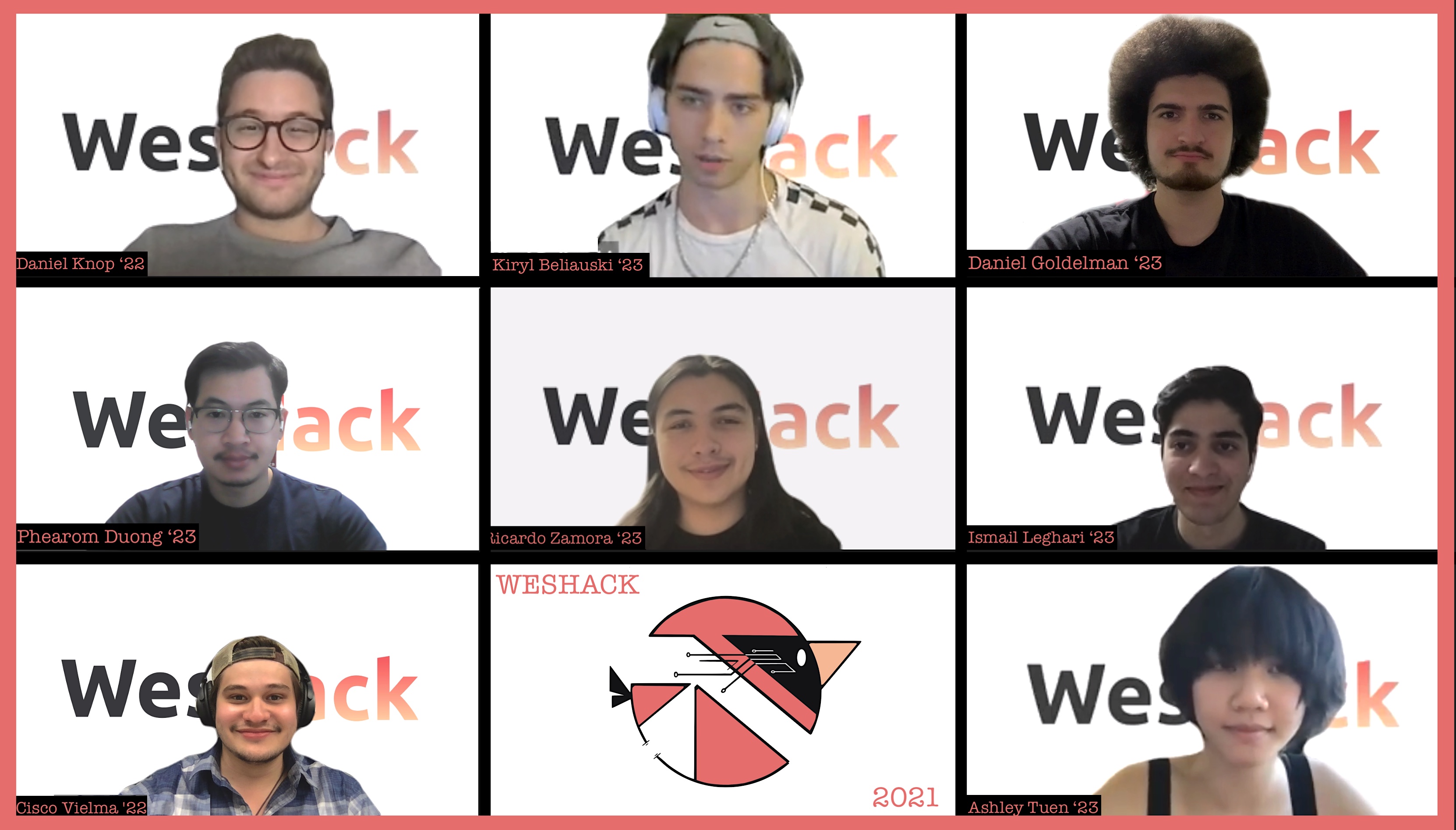
WesHack, a weekend-long programming competition, returned to campus virtually for the first time since 2014, occurring from Friday, April 23 to Sunday, April 25. The event was organized by several members of Wesleyan’s computer science community and student group Code_Wes, and over 45 students participated.
“A hackathon is a weekend-long event where software engineers, designers, and programmers come together to create a program/application in a short period of time and enter their creations to win various prizes,” the WesHack website reads.
WesHack was entirely organized by students and was sponsored by the Patricelli Center for Social Entrepreneurship, the Gordon Career Center, the Wesleyan Computer Science Department, Leo Labs, and several Middletown restaurants. Fifteen teams spent the weekend developing programs to support the theme of “Building Wes Through Code!”
According to organizer Daniel Goldelman ’23, WesHack 2021 differentiated itself from other hackathons by focusing on creating programs for the Wesleyan community while providing a community for participating students.
“The theme of WesHack was ‘Building Wes Through Code,’” Goldelman said. “So really just trying to create a project that’s going to help Wesleyan students, especially during COVID. In the beginning it was really like, ‘how can we get Wesleyan students to interact?’”
While the primary focus of the event was the programming competition, WesHack hosted a variety of other activities throughout the weekend to build community. Participants were able to communicate on a Discord channel and attend additional workshops via Zoom.
“WesHack scheduled a lot of [activities],” organizer Ashley Tuen ’23 said. “We had alumni talk, we had HTML, CSS, github workshops, we had Python Flask web hosting workshops. So there were an abundance of resources that sort of allowed this small period of time for people to actually come together and make something.”
Goldelman emphasized the community-building experience that the WesHack team sought to cultivate.
“The real reason for WesHack is because the CS [computer science] community is a community pretty much in name only,” Goldelman said. “There’s not a lot of events that actually happen or communication that’s going on. So, WesHack was really a way for us to start really creating that community and have a fun challenge for all for coders of all different levels and really start getting people active.”
WesHack organizer Daniel Knopf ’22 decided to work on the event to provide students with pragmatic coding experience. The intensive program and emphasis on teamwork aimed to help participants accomplish projects in a short time frame.
“I really wanted to do a hackathon because I knew that there were very few practical opportunities, and I wanted to make sure that people had these practical opportunities so that they could gain faith in their skills and produce something that would help the Wesleyan community become a lot more software engineering focused as opposed to theory focused,” Knopf said.
At the end of the weekend, several teams won awards for their programs. First prize was awarded to Jung Woo Cho ’21, Chunyue Ma ’22, Ammie Wang ’22, and Carl Gross ’23 for their program Wes-Goldilocks, a website which helps students keep track of their points and meals spending.
Knopf ’22 and his teammates, Isabel Armour-Garb ’22, Jack Canavan-Gosselin ’22, and Nalu Tripician ’22, won second place for their app Housing Options Made Easy.
“You can go and you can filter senior houses, based on a wide variety of filters and you can also submit ratings for them,” Knopf said. “My team is all juniors and we were really, really dissatisfied with the actual housing system at Wesleyan because there’s no way to filter based on pretty much anything. You have to make every estimate and a big excel spreadsheet which sucks.”
In the future, organizer Rome Duong ’23 hopes to expand WesHack to attract and include non-computer science majors or students with minimal coding experience.
“We would love to see more non-experienced coders participate in WesHack by participating in workshops, or just attending tours but because it’s not in person, we couldn’t really see other non-CS majors students or not as experienced students participating in WesHack,” Duong said. “Hopefully in the future, when we move this in-person, we will be able to plan more events that will be encouraging and inviting for less experienced students to join.”
To help this year’s program run, the organizers contacted those who put together and hosted a hackathon by the same name at the University in 2014.
“We contacted all of the people who ran WesHack in the past and we asked them for various things,” Knopf said. “Some of them were judges, some of them were mentors, some of them gave us advice. We got access to their Twitter and their Github so we could use all of that stuff, but I would say we’re a spiritual successor to them.”
The WesHack team plans on hosting the event again in 2022 in person. Before then, interested students are encouraged to get involved with Code_Wes, the University’s coding club, and participate in other hackathons.
“It’ll be just a thing that people do and it’ll help people get all this practical experience and kind of like enjoy building websites and making apps and creating programs and people will also feel confident in their ability to create all of these things,” Knopf said.
Nalu Tripician ’22 is a Web Editor at The Argus, and Daniel Knopf ’22 is a former Opinion Editor.
Orly Meyer can be reached at omeyer@wesleyan.edu.



Leave a Reply